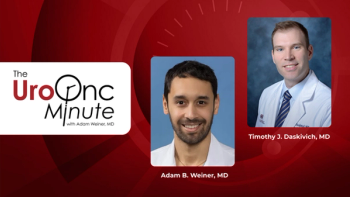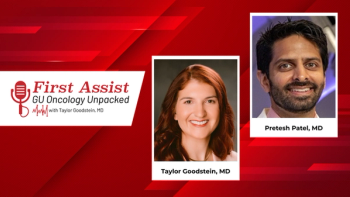
Kenneth G. Nepple, MD, discusses a quality improvement initiative focused on identifying patients with prostate cancer who may be eligible for genetic testing.

Kenneth G. Nepple, MD, discusses a quality improvement initiative focused on identifying patients with prostate cancer who may be eligible for genetic testing.

As the year comes to a close, we revisit some of this year’s top content on prostate cancer.

In this episode, Timothy Daskivich, MD, joins host Adam Weiner, MD, to discuss survivorship and long-term quality-of-life considerations in prostate cancer care.

"The overall 0% impact to urology does not help urology practices deal with increasing costs incurred for staff, rent, supplies, and other overhead," write Jonathan Rubenstein, MD, and Mark Painter.

The application is supported by results from the phase 3 PIVOT-PO trial.

The PROSTOX ultra test identifies men with localized prostate cancer who are at a higher risk of developing late GU toxicity from radiation, helping to inform treatment decisions.

The approval is supported by data from the TRITON3 trial.

Patients with GG1 disease and a high genomic classifier score had a significantly higher risk of disease progression.

A key theme throughout the forum was the importance of assessing disease volume and clinical presentation at diagnosis.

The combination yielded significant improvements in event-free survival, overall survival, and pathologic complete response rates vs neoadjuvant chemotherapy.

When discussing treatment goals, clinicians underscored the importance of individualizing systemic therapy.

The combination demonstrated a disease-specific survival rate of 98.7% at 12 months and 96.0% at 36 months.

The safety and efficacy of the Revi System were established in the pivotal OASIS trial.

This episode offers practical insights for clinicians navigating complex prostate cancer cases and underscores how precision imaging and tailored radiation strategies are redefining care for patients with advanced disease.

Abhishek Srivastava, MD, discusses the potential impact that UGN-103 might have on the treatment landscape for LG-IR-NMIBC.

"In my experience, when a treatment is well-tolerated and given on a predictable schedule, patients are more likely to adhere to therapy and remain engaged in long-term follow-up," Chauhan writes.

With this approval, flibanserin becomes the first and only treatment of its kind for women younger than 65 years.

The approval is supported by data from the phase 3 AMPLITUDE trial.

In a phase 3 trial, zoliflodacin demonstrated non-inferior efficacy compared with ceftriaxone plus azithromycin.

Nogapendekin alfa inbakicept was approved in combination with BCG in the US in April 2024.

Data from the pivotal BREEZE study indicated a mean IPSS improvement of 37% in patients receiving the system.

The approval is supported by data from the phase 3 EAGLE-1 trial.

Ibrahim explains the unique challenges men face after spinal cord injury, including neurogenic erectile dysfunction, ejaculatory dysfunction, and particularly the distinctive sperm abnormalities seen in this population.

In a panel meeting convened by the FDA, experts urged the agency to revise the current classification and indication for testosterone replacement therapy in men.

Daré Bioscience said the sildenafil cream’s availability will expand to other states throughout December 2025 and early 2026.

"If 2025 showed us anything, it is the power of combining scientific progress with public engagement," writes Michael S. Cookson, MD, MMHC, FACS.

The approval is supported by results from the randomized ProVIDE study.

The pilot study plans to enroll patients with locally recurrent prostate cancer across clinical trial sites in the US.

The FDA has selected detalimogene voraplasmid to participate in the Chemistry, Manufacturing, and Controls Development and Readiness Pilot Program.

The phase 1 study will assess the safety and feasibility of SPECT/CT imaging with [111In]In-ART-101.